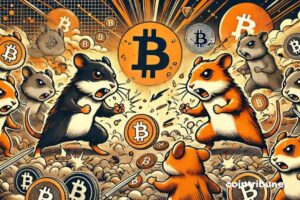Tap tap…nothing!
It was never to be. Hundreds of millions of promised coins only good enough to purchase lottery tickets. Oops!
Crushed!
One of the latest entries in the NFT gaming space, Hamster Kombat has made headlines for all the wrong reasons, after an eagerly awaited airdrop left players disillusioned and upset. The airdrop, initially seen as a golden opportunity for players to enhance their gaming experience and gain valuable rewards, turned out to be nothing more than “dust,” a term used to describe minuscule rewards that hold little to no value.
When the airdrop was first announced, the Hamster Kombatcommunity was buzzing with excitement. Players believed they would be receiving game-changing assets or tokens that could significantly bolster their in-game abilities or even bring real-world financial gains. The airdrop was intended to reward loyal players for their continued engagement and time spent within the game. As is common in NFT gaming, expectations were high, and many were under the impression that the airdrop would reflect the value they had invested in the game. However, when the rewards finally landed, they were shockingly underwhelming.

All Dust
The airdrop, which many expected to be a windfall of valuable assets, ended up delivering insignificant sums of tokens or in-game items that barely made a dent in players’ progress. What was initially seen as a major reward event soon became the subject of ridicule, with disgruntled players calling it a “dust drop” on social media. The disappointment spread quickly as players shared screenshots of their rewards, pointing out how the airdrop had failed to live up to the hype. It wasn’t just the size of the rewards that drew ire, but the disparity between player expectations and the reality of what was delivered.
This incident isn’t isolated to Hamster Kombat but speaks to a broader issue plaguing the NFT gaming space. In many play-to-earn games, players invest significant amounts of time and, in some cases, money, expecting tangible returns through digital assets. These assets, whether they are in the form of tokens, in-game items, or NFTs, are often touted as valuable commodities that can be traded or sold on secondary markets. But when promised rewards like airdrops fail to meet expectations, it can undermine the trust that players have in the game’s developers and the play-to-earn model itself.
What makes the Hamster Kombat airdrop particularly damaging is that it could erode long-term engagement with the game. Airdrops are often used as incentives to maintain player interest and reward loyalty. When these incentives fall flat, it not only leaves players frustrated but can also drive them away from the game entirely. In a competitive gaming environment where players have countless other options, a blunder like this can have serious consequences for player retention.
The Cycle of Pain Continues
For Hamster Kombat, the missed opportunity to satisfy its player base with meaningful rewards might lead to an exodus of frustrated users seeking better opportunities elsewhere.

In fact, some players have already started comparing Hamster Kombat to other NFT games that have successfully delivered on their promises. Games like Axie Infinity and Gods Unchained have set a high standard for player rewards, with their airdrops and play-to-earn models yielding substantial returns for players who invested time and effort. These games have managed to build trust and a loyal player base, largely because they have delivered rewards that reflect the value players expect. Unfortunately for Hamster Kombat, its recent airdrop failed to do the same, leaving it at a disadvantage in the increasingly crowded NFT gaming market.
This debacle also highlights a fundamental problem with how airdrops are often communicated to players. In the case of Hamster Kombat, the marketing and build-up to the airdrop created unrealistic expectations. Players were led to believe that the rewards would be significant, but there was little transparency about what they would actually receive. When the airdrop fell short, the lack of clear communication exacerbated the disappointment. For NFT games to thrive, developers must strike a balance between creating excitement and setting realistic expectations. Overpromising and underdelivering is a surefire way to alienate a player base that thrives on trust and transparency.
Moreover, this incident has sparked debates about the sustainability of the play-to-earn model itself. Many players enter these games with the hope of making real-world profits, but when rewards are negligible, it calls into question whether these games can truly offer long-term value. The promise of wealth through gaming has drawn many to the NFT space, but events like this one remind us that the road to profitability is not always smooth. While some players may profit from well-timed trades and investments, others are left disillusioned when rewards fail to materialize as expected.
Interestingly, the developers of Hamster Kombat have remained largely silent on the issue, offering no substantial explanation or apology for the airdrop’s shortcomings. This silence only deepens the frustration among players, who feel that their time and loyalty have been taken for granted. In the absence of any official statement, players are left to speculate about what went wrong and whether the developers are willing to address the problem moving forward. A clear response, along with plans for future improvements, could help mitigate some of the damage, but the longer the silence persists, the more disillusioned the player base may become.
Ultimately, the Hamster Kombat airdrop fiasco serves as a cautionary tale for both players and developers in the NFT gaming space. For players, it’s a reminder that not all airdrops will live up to the hype, and managing expectations is crucial. For developers, it underscores the importance of transparency, communication, and delivering rewards that align with player investment. As the NFT gaming industry continues to evolve, those who fail to meet these standards risk losing the trust and loyalty of their player communities.
The Hamster Kombat airdrop may have dashed hopes, but it has also offered valuable lessons for the NFT gaming space. If developers can learn from this misstep and prioritize player satisfaction, future rewards can regain the excitement and value they were meant to provide.












